- Role of social media, tech companies and government regulation
- Americans’ day-to-day experiences with online privacy
- Personal data and information
- Feelings of concern, confusion and a lack of control over one’s data
- Privacy laws and regulation
- Americans largely favor more regulation to protect personal information
- Trust in social media executives
- Children’s online privacy: Concerns and responsibility
- Law enforcement and surveillance
- AI and data collection
- Trust in companies that use AI
- How people approach privacy policies
- How people are protecting their digital privacy
- How Americans handle their passwords
- Data breaches and hacks
- Identifying the most and least knowledgeable, confident and concerned
- Knowledge and privacy choices
- Confidence and privacy choices
- Concern and privacy choices
- The case of privacy policies
- The American Trends Panel survey methodology
The role of technology companies, AI and regulation – plus personal experiences with data breaches, passwords, cybersecurity and privacy policies

Pew Research Center has a long record of studying Americans’ views of privacy and their personal data, as well as their online habits. This study sought to understand how people think about each of these things – and what, if anything, they do to manage their privacy online.
This survey was conducted among 5,101 U.S. adults from May 15 to 21, 2023. Everyone who took part in the survey is a member of the Center’s American Trends Panel (ATP), an online survey panel that is recruited through national, random sampling of residential addresses. This way nearly all U.S. adults have a chance of selection. The survey is weighted to be representative of the U.S. adult population by gender, race and ethnicity, partisan affiliation, education and other categories. Read more about the ATP’s methodology.
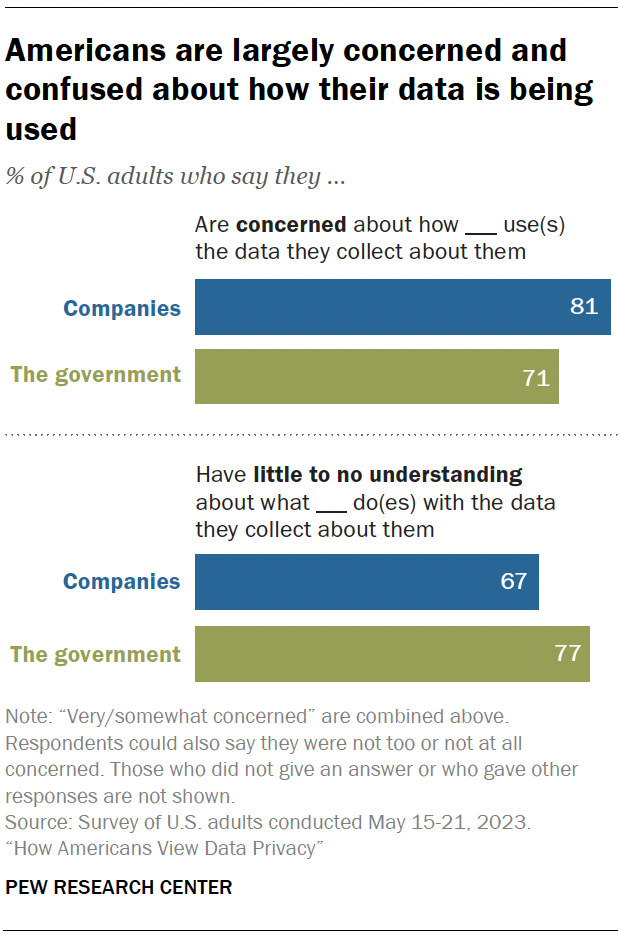
In an era where every click, tap or keystroke leaves a digital trail, Americans remain uneasy and uncertain about their personal data and feel they have little control over how it’s used.
This wariness is even ticking up in some areas like government data collection, according to a new Pew Research Center survey of U.S. adults conducted May 15-21, 2023.
Today, as in the past, most Americans are concerned about how companies and the government use their information. But there have been some changes in recent years:
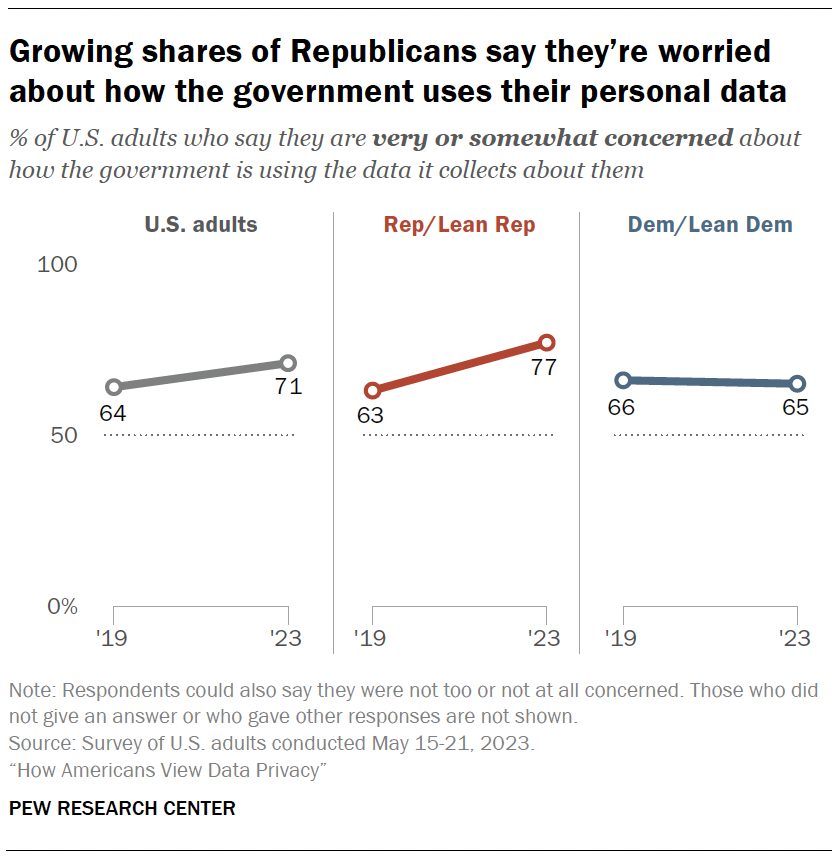
Americans – particularly Republicans – have grown more concerned about how the government uses their data. The share who say they are worried about government use of people’s data has increased from 64% in 2019 to 71% today. That reflects rising concern among Republicans (from 63% to 77%), while Democrats’ concern has held steady. (Each group includes those who lean toward the respective party.)
The public increasingly says they don’t understand what companies are doing with their data. Some 67% say they understand little to nothing about what companies are doing with their personal data, up from 59%.
Most believe they have little to no control over what companies or the government do with their data. While these shares have ticked down compared with 2019, vast majorities feel this way about data collected by companies (73%) and the government (79%).
We’ve studied Americans’ views on data privacy for years. The topic remains in the national spotlight today, and it’s particularly relevant given the policy debates ranging from regulating AI to protecting kids on social media. But these are far from abstract concepts. They play out in the day-to-day lives of Americans in the passwords they choose, the privacy policies they agree to and the tactics they take – or not – to secure their personal information. We surveyed 5,101 U.S. adults using Pew Research Center’s American Trends Panel to give voice to people’s views and experiences on these topics.
In addition to the key findings covered on this page, the three chapters of this report provide more detail on:
- Views of data privacy risks, personal data and digital privacy laws (Chapter 1). Concerns, feelings and trust, plus children’s online privacy, social media companies and views of law enforcement.
- How Americans protect their online data (Chapter 2). Data breaches and hacks, passwords, cybersecurity and privacy policies.
- A deep dive into online privacy choices (Chapter 3). How knowledge, confidence and concern relate to online privacy choices.
Role of social media, tech companies and government regulation
Trust in social media CEOs
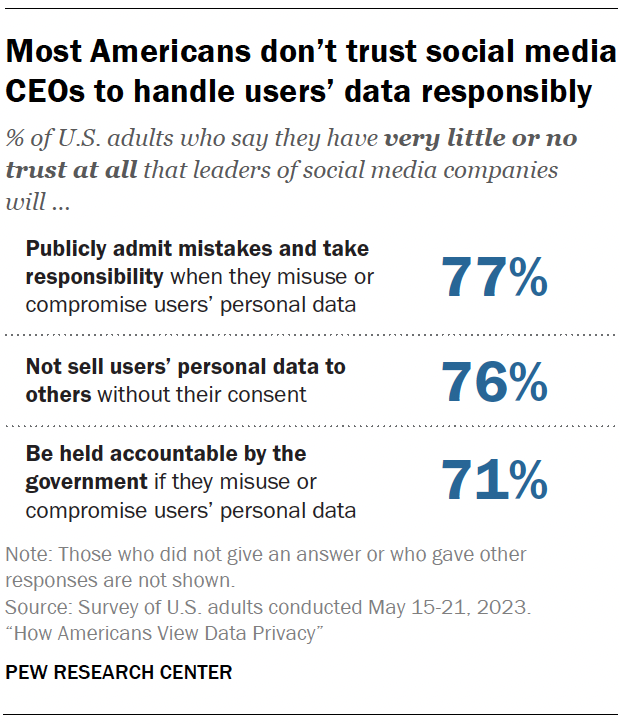 responsibility for mistakes when they misuse or compromise it" width="620" height="724" />
responsibility for mistakes when they misuse or compromise it" width="620" height="724" />
Americans have little faith that social media executives will responsibly handle user privacy.
Some 77% of Americans have little or no trust in leaders of social media companies to publicly admit mistakes and take responsibility for data misuse.
And they are no more optimistic about the government’s ability to rein them in: 71% have little to no trust that these tech leaders will be held accountable by the government for data missteps.
Artificial intelligence
People’s views on artificial intelligence (AI) are marked with distrust and worry about their data.
As AI raises new frontiers in how people’s data is being used, unease is high. Among those who’ve heard about AI, 70% have little to no trust in companies to make responsible decisions about how they use it in their products.
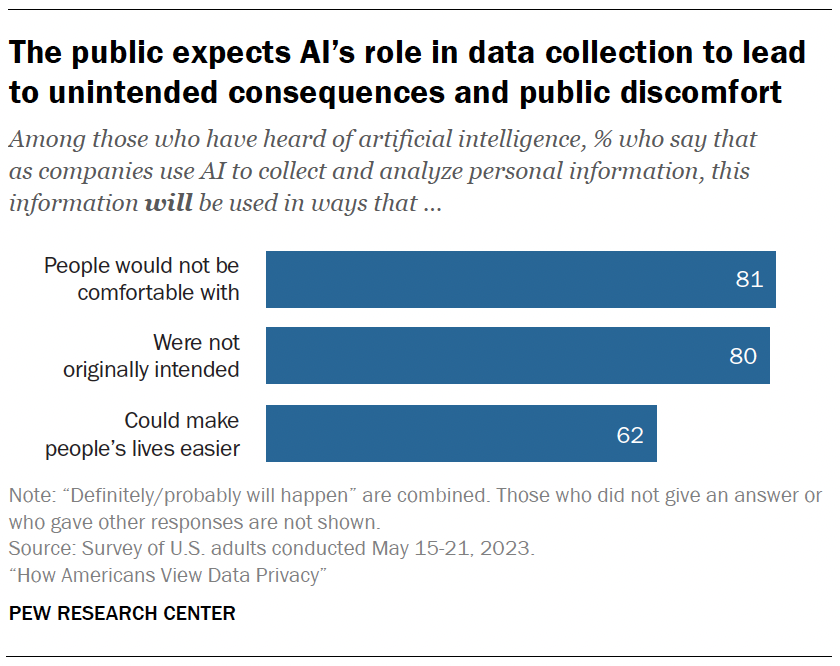
And about eight-in-ten of those familiar with AI say its use by companies will lead to people’s personal information being used in ways they won’t be comfortable with (81%) or that weren’t originally intended (80%).
Still, there’s some positivity: 62% of Americans who’ve heard of AI think that as companies use it, people’s information will be used to make life easier.
Children’s online privacy
Americans worry about kids’ online privacy – but largely expect parents to take responsibility. Some 89% are very or somewhat concerned about social media platforms knowing personal information about kids. Large shares also worry about advertisers and online games or gaming apps using kids’ data. And while most Americans (85%) say parents hold a great deal of responsibility for protecting kids’ online privacy, 59% also say this about tech companies and 46% about the government.
Government regulation
There is bipartisan support for more regulation of what companies can do with people’s data. Some 72% of Americans say there should be more regulation than there is now; just 7% say there should be less. Support for more regulation reaches across the political aisle, with 78% of Democrats and 68% of Republicans taking this stance.
Americans’ day-to-day experiences with online privacy
Americans’ day-to-day experiences reflect the difficulty of managing your privacy, even amid widespread concern. Some people are overwhelmed navigating the options tech companies provide or skeptical these steps will make a difference. And at times, people fail to take steps to safeguard their data.
Feelings about managing online privacy
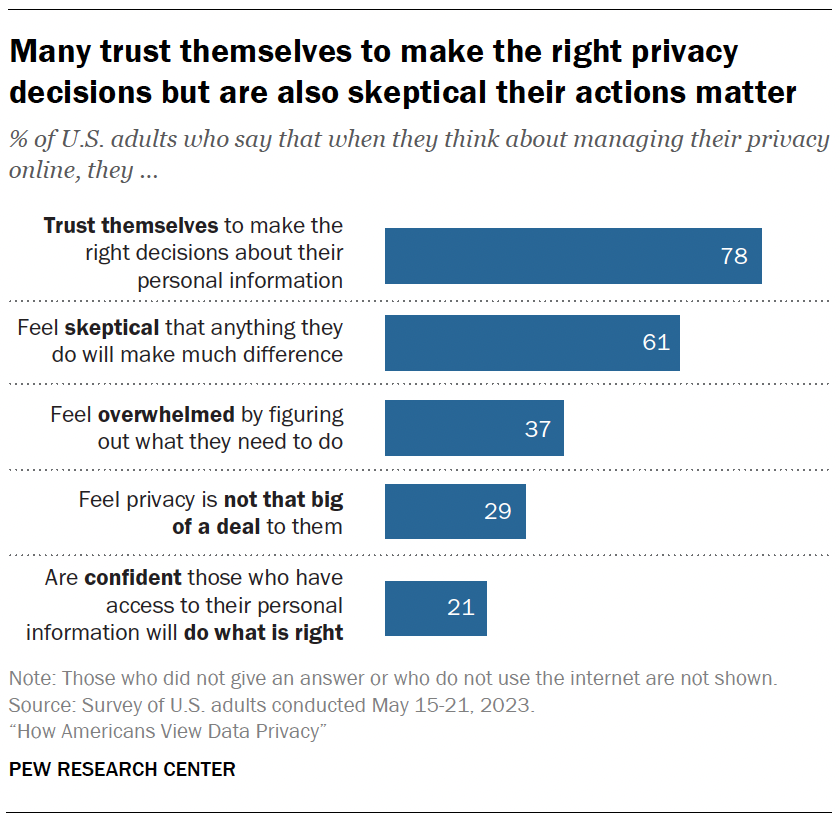 skeptical their actions matter" width="840" height="820" />
skeptical their actions matter" width="840" height="820" />
Americans’ feelings about managing their online privacy range from confident to overwhelmed. Most Americans (78%) trust themselves to make the right decisions about their personal information.
But a majority say they’re skeptical anything they do will make much difference. And only about one-in-five are confident that those who have their personal information will treat it responsibly.
How people approach privacy policies
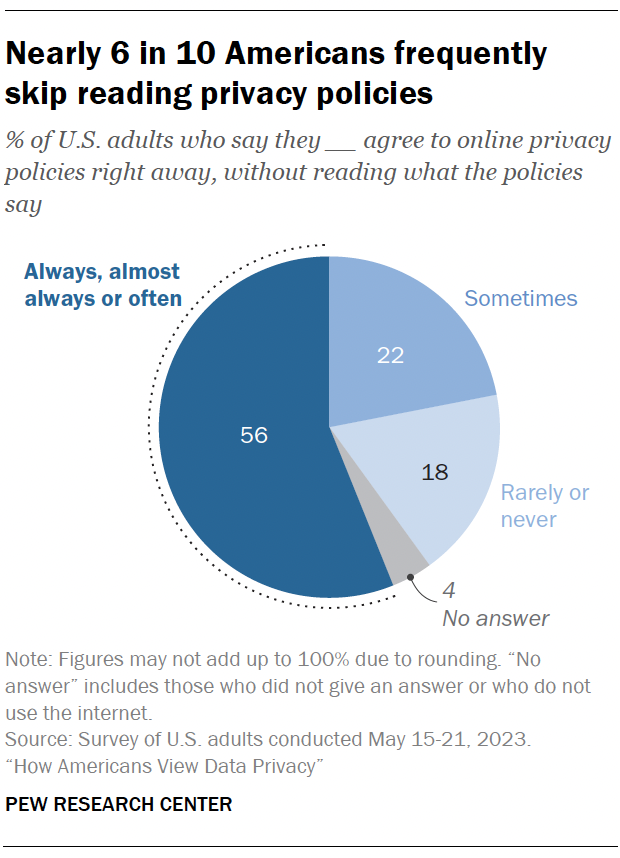
Privacy policies used by apps, websites and other online services allow users to review and consent to what is being done with their data.
But many say privacy policies’ long and technical nature can limit their usefulness – and that consumers lack meaningful choices.
Our survey finds that a majority of Americans ignore privacy policies altogether: 56% frequently click “agree” without actually reading their content.
People are also largely skeptical that privacy policies do what they’re intended to do. Some 61% think they’re ineffective at explaining how companies use people’s data. And 69% say they view these policies as just something to get past.
Password overload
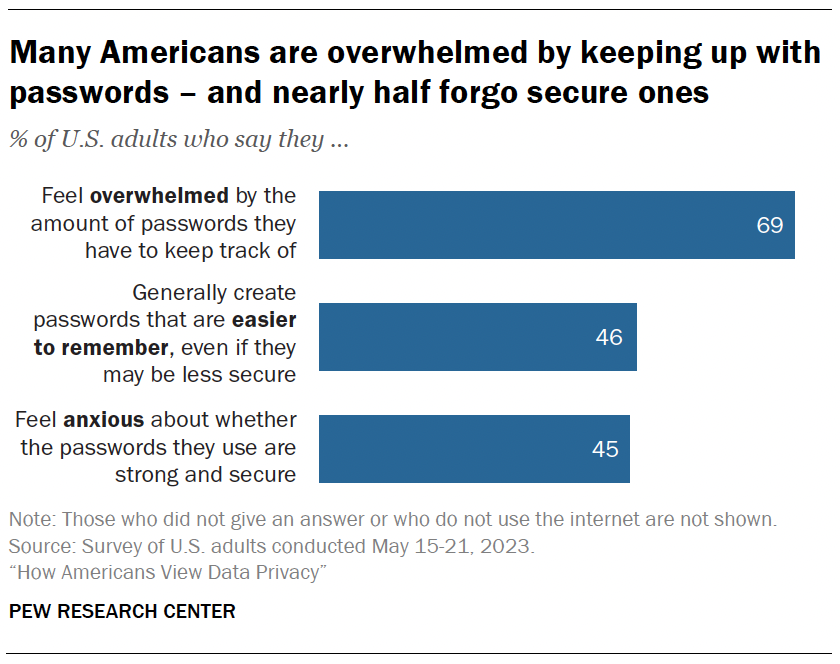
From social media accounts to mobile banking and streaming services, Americans must keep track of numerous passwords. This can leave many feeling fatigued, resigned and even anxious.
This survey finds about seven-in-ten Americans (69%) are overwhelmed by the number of passwords they have to keep track of. And nearly half (45%) report feeling anxious about whether their passwords are strong and secure.
But despite these concerns, only half of adults say they typically choose passwords that are more secure, even if they are harder to remember. A slightly smaller share opts for passwords that are easier to remember, even if they are less secure.
Password management
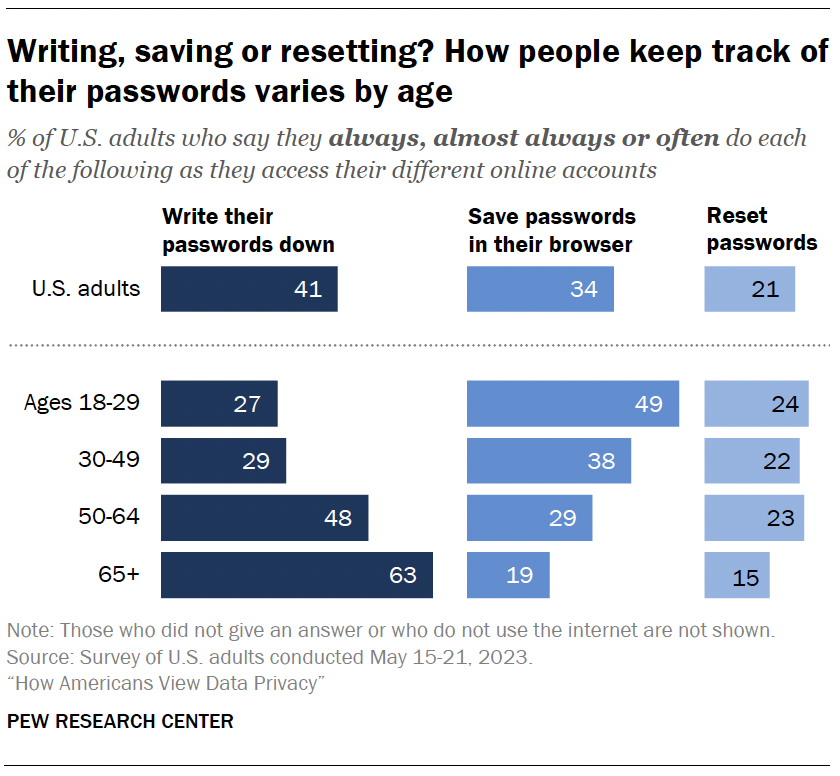
The public is adopting a range of strategies for managing their passwords.
Some 41% of Americans say they always, almost always or often write down their passwords. A slightly smaller share (34%) save their passwords in their browser with the same frequency. And 21% regularly reset the passwords to their online accounts.
These tactics vary across age groups. Some 63% of Americans ages 65 and older regularly write their passwords down. By contrast, 49% of adults under 30 say the same about saving their passwords in their browser.
One recommended approach to password management is becoming more common: More Americans are turning to password managers for help.
The share who say they use a password manager has risen from 20% in 2019 to 32% today. And roughly half of those ages 18 to 29 (49%) say they use these tools.
Smartphone security
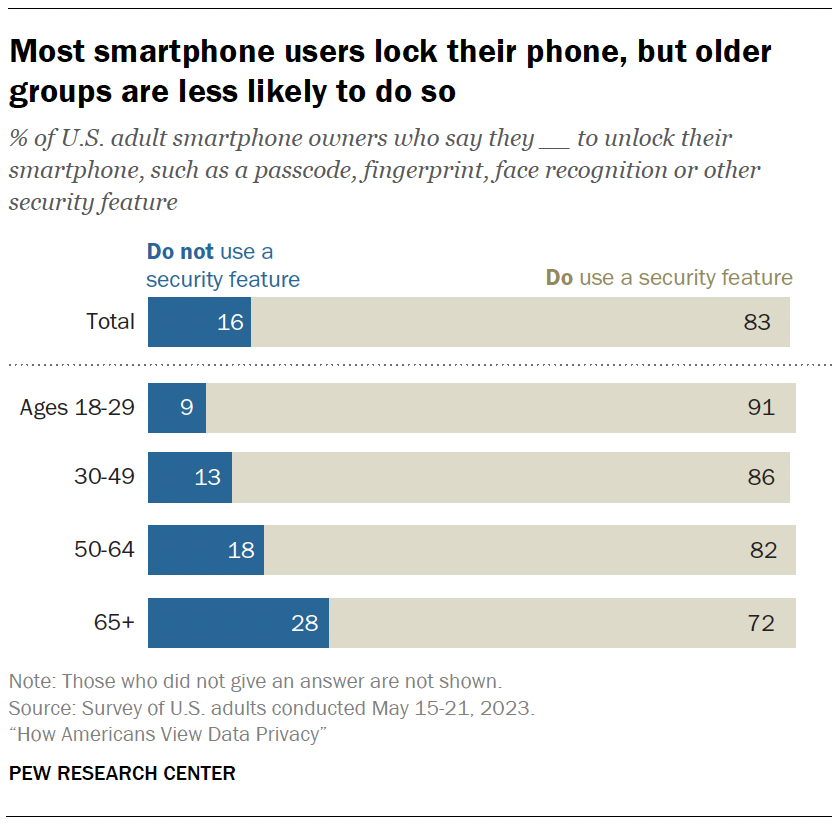
Even so, some riskier privacy habits linger. Notably, 16% of smartphone users say they do not use a security feature – like a passcode, fingerprint or face recognition – to unlock their phone.
And this is more common among older smartphone users. Those ages 65 and older are more likely than adults under 30 to say they do not use a security feature to unlock their mobile devices (28% vs. 9%).
Still, most users across age groups do take this security precaution.
Data breaches and hacks
Today’s data environment also comes with tangible risks: Some Americans’ personal information has fallen into the wrong hands.
Roughly one-quarter of Americans (26%) say someone has put fraudulent charges on their debit or credit card in the last 12 months. And 11% have had their email or social media accounts taken over without permission, while 7% have had someone attempt to open a line of credit or apply for a loan in their name.
All told, 34% have experienced at least one of these things in the past year.